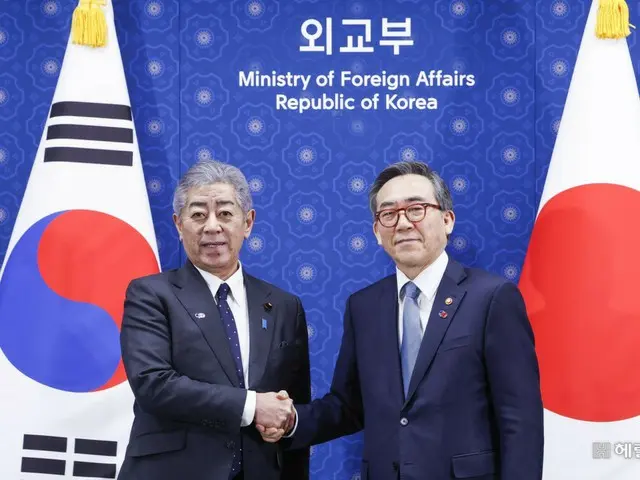- Political turmoil continues after President Yoon Seok-yeol declared "emergency martial law." The two foreign ministers said that the importance of Japan-Korea relations remains unchanged amid an increasingly severe security environment.
They shared their views once again and confirmed that regardless of the domestic political situation in South Korea, the exchange programs for the 60th anniversary of the normalization of diplomatic relations will proceed as scheduled.
This was Iwaya's first visit to South Korea since taking office in October last year.
This will be the first visit to South Korea by a foreign minister since November 2023, about one year and two months ago. Prior to the meeting, Iwaya visited the Seoul National Cemetery. The National Cemetery enshrines independence activists from the Japanese colonial period.
The cemetery, which covers an area of 130,000 square meters, is divided into seven areas: former heads of state, patriotic patriots, men of national merit, military personnel and military service officers, police officers, ordinary citizens, and foreigners.
It has been about seven years since then-Foreign Minister Taro Kono visited the memorial in 2018. Iwaya offered flowers after offering a moment of silence and incense in front of the memorial. Regarding Iwaya's visit, South Korea's public broadcaster KBS said, "The visit of the Korean
"This is being evaluated as a sign of the intention to strengthen Korea-Japan relations, even in the midst of the unstable political situation in Korea," the report said.
A type of martial law defined by the Constitution. It is issued by the president in times of war or other emergency situations, when it is necessary for military purposes, or to maintain public order. Martial law was first issued in 1987, when the country became a democratic nation.
Following the declaration, armed soldiers of the martial law army broke the windows and stormed into the National Diet Building. In a scene reminiscent of the military regime, many citizens gathered in front of the National Diet building and protested against the martial law.
In addition to raising slogans against the government, they surrounded military vehicles, causing chaos. However, martial law is lifted only if a majority of members of the National Assembly request it, and the president must comply with this request.
A plenary session of the National Assembly was held, and all the lawmakers present voted in favor of lifting the state of emergency. Yoon lifted it in just six hours. Opposition parties, including the Democratic Party of Korea, criticized Yoon for "attempting to suspend the constitutional order and exert permanent control over the government."
The bill to impeach Yoon was submitted to the National Assembly, citing "attempted insurrection to seize power and seize the presidency," and other violations of the Constitution. The bill was passed by 204 votes in favor and 85 against on the 14th of last month.
As a result, Yoon has been suspended from his duties and Deputy Prime Minister for Economic Affairs and Minister of Strategy and Finance Choi Sang-mok is now acting as president.
The declaration of emergency law has caused great political and social unrest, and the opposition party has
Yoon was accused of being involved in a civil war. The independent investigative agency, the High-Ranking Public Officials Crime Investigation Agency (PPA), and the police joint investigation headquarters conducted the investigation, and the headquarters arrested Yoon on the 15th. On the 19th, he was taken into custody by the court.
The government issued an arrest warrant, making Yoon the first sitting president of South Korea to be arrested in the country's constitutional history. The meeting between Iwaya and Cho lasted about an hour and a half.
In light of the fact that this year marks the 60th anniversary of the normalization of diplomatic relations, the two leaders confirmed that they will further promote exchanges between the people of Japan and Korea, especially among young people who will shoulder the future of Japan-Korea relations.
In addition, with the inauguration of the second Trump administration, it was confirmed that Japan, the United States, and South Korea will continue to cooperate with each other. North Korea has accelerated its nuclear and missile development and strengthened military cooperation with Russia.
At a joint press conference after the meeting, Iwaya said, "The importance of Japan-Korea relations has not only remained unchanged, but has actually increased.
"I would like to continue to maintain close communication between our foreign ministers in order to maintain and develop the current trend of improvement in Japan-ROK relations."
"We will continue to steadily advance Korea-Japan relations under any circumstances," Cho said.
"I am grateful to Minister Iwaya for proving through his actions that a friend in difficult times is a friend indeed," Iwaya said.
He also met with the Minister of Strategy and Finance for about 30 minutes. Choi explained the domestic political situation in South Korea to Iwaya. "We are working to implement policies stably in accordance with the constitution and laws," he said.
In light of the fact that this meeting took place amid political turmoil in South Korea, South Korean media outlet Hankyoreh reported, "The South Korean and Japanese foreign ministers vowed to "unwaveringly advance South Korea-Japan relations under any circumstances."
"The (South Korean) government is emphasizing the signal that South Korean diplomacy is functioning even amid domestic political turmoil," the report said.
2025/01/21 13:29 KST
Copyrights(C)wowkorea.jp 5

